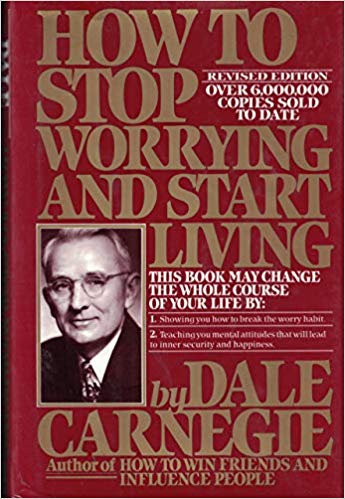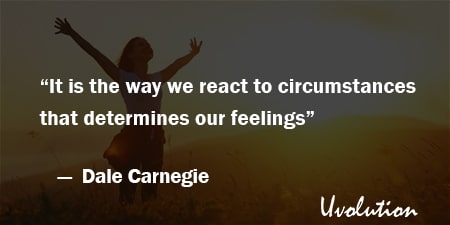How to Stop Worrying and Start Living by Dale Carnegie
The Book in 1 Sentences
“No one living has enough emotion and vigor to fight the inevitable and, at the same time, enough left over to create a new life. Choose one or the other. You can either bend with the inevitable sleetstorms of life—or you can resist them and break!” ~ Dale Carnegie
9 BIG Ideas
How to Stop Worrying and Start Living Book Summary
1. Why to fight worry
“Seventy per cent of all patients who come to physicians could cure themselves if they got rid of their fears and worries.”
Carnegie quotes a Dr. Montague: “You do not not get stomach ulcers from what you eat. You get ulcers from what is eating you.”
And a Dr. Alexis Carrel: “Those who do not know how to fight worry die young.”
And Plato: “The greatest mistake physicians make is that they attempt to cure the body without attempting to cure the mind; yet the mind and the body are one and should not be treated separately!”
“Obviously, circumstances alone do not make us happy or unhappy. It is the way we react to circumstances that determines our feelings. Jesus said that the kingdom of heaven is within you. That is where the kingdom of hell is, too.”
“Epictetus, the great Stoic philosopher, warned that we ought to be more concerned about removing wrong thoughts from the mind than about removing ‘tumors and abscesses from the body.’”
2. From now until bedtime
“So let’s be content to live the only time we can possibly live: from now until bedtime. ‘Anyone
can carry his burden, however hard, from now until nightfall,’ wrote Robert Louis Stevenson.
‘Anyone can do his work, however hard, for one day. Anyone can live sweetly, patiently, lovingly, purely, till the sun goes down. And this is all that life really means.’
Jesus: “Have no anxiety for the tomorrow.”
Montaigne: “My life has been full of terrible misfortunes most of which never happened.”
Dante: “Think that this day will never dawn again.”
Carlyle: “Our main business is not to see what lies dimly at a distance, but to do what lies clearly at hand.”
Horace: “Happy the man, and happy he alone, | He, who can call to-day his own: | He who, secure within can say: | “To-morrow, do thy worst, for I have liv’d today.”
“Shut the iron doors on the past and the future. Live in Day-tight compartments.” And ask yourself:
1. “Do I tend to put off living in the present in order to worry about the future, or to yearn for some ‘magical rose garden over the horizon’?
2. Do I sometimes embitter the present by regretting things that happened in the past—that are over and done with?
3. Do I get up in the morning determined to ‘Seize the day’—to get the utmost out of these twenty-four hours?
4. Can I get more out of life by ‘living in day-tight compartments’?
5. When shall I start to do this? Next week? … Tomorrow? … Today?”
“I spent twelve years working with cattle; yet I never saw a Jersey cow running a temperature because the pasture was burning from lack of rain or because of sleet and cold or because her boy friend was paying too much attention to another heffer. The animals confront night, storms, and hunger calmly; so they never have nervous breakdowns or stomach ulcers; and they never go insane.”
3. Quit arguing with reality
“Professor William James, the father of applied psychology, has been dead since 1910. But if he were alive today, and could hear this formula for facing the worst, he would heartily approve of it.
How do I know that? Because he told his own students: ‘Be willing to have it so… Be willing to have it so,’ he said, because ‘…acceptance of what has happened is the first step in overcoming the consequences of any misfortune.’"
Deepak Chopra - in his great book The Seven Spiritual Laws of Success- also says: “This means that your acceptance of this moment is total and complete. You accept things as they are, not as you wish they were in this moment. This is important to understand. You can wish for things in the future to be different, but in this moment you have to accept things as they are.”
Marcus Aurelius -in Meditations- says: “So here is a rule to remember in future, when anything tempts you to feel bitter: not, ‘This is a misfortune,’ but ‘To bear this worthily is a good fortune.’”
4. 4 Steps to deal with your worries
“Experience has proved to me, time after time, the enormous value of arriving at a decision. It is the failure to arrive at a fixed purpose, the inability to stop going around and round in maddening circles, that drives men to nervous breakdowns and living hells.
I find that fifty per cent of my worries vanishes once I arrive at a clear, definite decision; and another forty per cent usually vanishes once I start to carry out that decision.
So, I banish about 90 per cent of my worries by taking these four steps:
1. Writing down precisely what I am worried about.
2. Writing down what I can do about it.
3. Deciding what to do.
4. Starting immediately to carry out that decision.”
5. Don’t cry over spilt milk
“Some readers are going to snort at the idea of making so much over a hackneyed proverb like ‘Don’t cry over spilt milk.’ I know it is trite, commonplace, a platitude. I know you have heard it a thousand times. But I also know that these hackneyed proverbs contain the very essence of the distilled wisdom of all ages.
They have come out of the fiery experience of the human race and have been handed down through countless generations. If you were to read everything that has ever been written about worry by the great scholars of all time, you would never read anything more basic or more profound than such hackneyed proverbs as ‘Don’t cross your bridges until you come to them’ and ‘Don’t cry over spilt milk.’
If we only applied those two proverbs—instead of snorting at them-—we wouldn’t need this book at all. In fact, if we applied most of the old proverbs, we would lead almost perfect lives.
However, knowledge isn’t power until it is applied; and the purpose of this book is to remind you of what you already know and to kick you in the shins and inspire you to do something about applying it.”
6. Rest before you get tired
“So, to prevent fatigue and worry, the first rule is: Rest often. Rest before you get tired.”
“Your heart pumps enough blood through your body every day to fill a railway tank car. It exerts enough energy every twenty-four hours to shovel twenty tons of coal onto a platform three feet high. It does this incredible amount of work for fifty, seventy, or maybe ninety years.
How can it stand it? Dr. Walter B. Cannon, of the Harvard Medical School, explained it. He said ‘Most people have the idea that the heart is working all the time. As a matter of fact, there is a definite rest period after each contraction. When beating at a moderate rate of seventy pulses per minute, the heart is actually working only nine hours out of the twenty-four. In the aggregate its rest periods total a full fifteen hours per day.’"
“Psychiatrists declare that most of our fatigue derives from our mental and emotional attitudes… What kinds of emotional factors tire the sedentary (or sitting) worker? Joy? Contentment? No! Never! Boredom, resentment, a feeling of not being appreciated, a feeling of futility, hurry, anxiety, worry—those are the emotional factors that exhaust the sitting worker, make him susceptible to colds, reduce his output, and send him home with a nervous headache. Yes, we get tired because our emotions produce nervous tensions in the body.”
“I know with conviction beyond all doubt that the biggest problem you and I have to deal with—in fact, almost the *only* problem we have to deal with—is choosing the right thoughts. If we can do that, we will be on the highroad to solving all our problems.”
7. How to relax
“What is the answer to this fatigue? Relax! Relax! Relax! Learn to relax while you are doing your work!”
How?
1. “Relax in odd moments. Let your body go limp like an old sock.”
2. “Work, as much as possible, in a comfortable position.”
3. “Check yourself four or five times a day, and say to yourself, ‘Am I making my work harder than it actually is? Am I using muscles that have nothing to do with the work I’m doing?’”
4. “Test yourself again at the end of the day, by asking yourself, ‘Just how tired am I? If I am tired, it is not because of mental work I have done but because of the way I have done it.’”
“Let me repeat: do what the Army does—take frequent rests. Do what your heart does—rest before you get tired, and you will add one hour a day to your waking life.”
8. People are not thinking about you
“I realize now that people are not thinking about you and me or caring what is said about us. They are thinking about themselves—before breakfast, after breakfast, and right on until ten minutes past midnight.
They would be a thousand times more concerned about a slight headache of their own than they would about the news of your death or mine.”
9. Get busy
“George Bernard Shaw was right. He summed it all up when he said: ‘The secret of being miserable is to have the leisure to bother about whether you are happy or not.’ So don’t bother to think about it! Spit on your hands and get busy.
Your blood will start circulating; your mind will start ticking—and pretty soon this whole positive upsurge of life in your body will drive worry from your mind. Get busy. Keep busy. It’s the cheapest kind of medicine there is on this earth—and one of the best.”
That was my QUICK summary of the great book How to Stop Worrying and Start Living by Dale Carnegie. If you’re interested, get your copy. There is a HUGE amount of life-changing ideas in this book, and we’ve only touched on a tiny bit of it.
Buy The Book: How to Stop Worrying and Start Living by Dale Carnegie

GET Blinkist 7 Days FREE Trial
3000+ Book Summaries
(Audio and Text)








